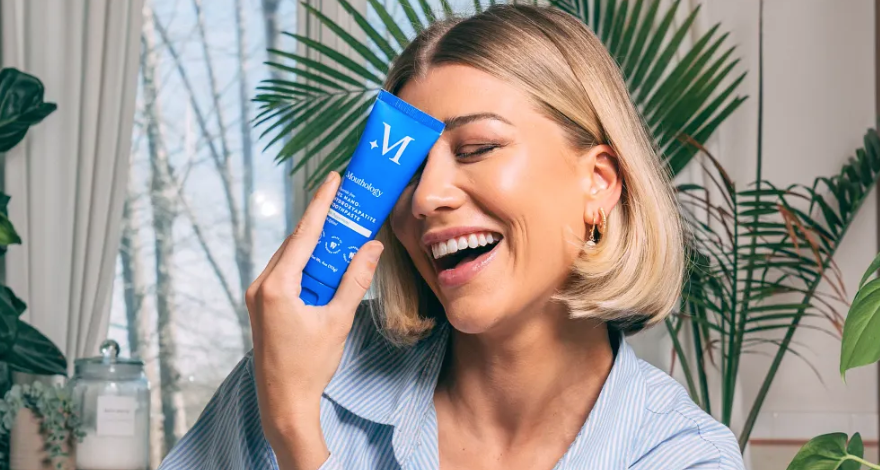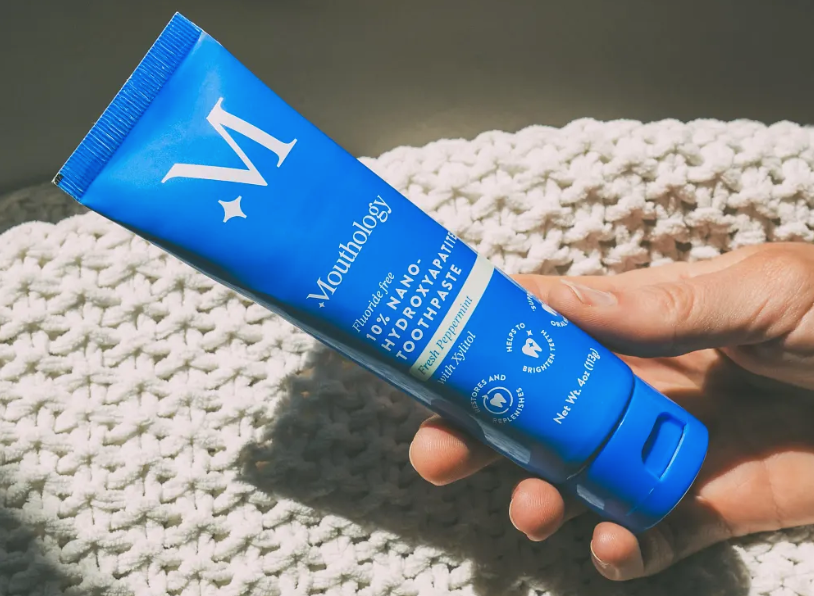Choosing the right toothpaste can be a daunting task, especially when you’re looking for a safer, effective alternative to fluoride. Many are now turning to synthetic hydroxyapatite, a great alternative that’s making waves in dental care. But how exactly does using hydroxyapatite compare to traditional fluoride toothpaste? Does hydroxyapatite toothpaste work as well as its fluoride counterparts?
In this guide, we’ll delve into the difference between hydroxyapatite and fluoride, explore the benefits of nano-hydroxyapatite, and discuss its applications in oral health.
Stay tuned to learn more about this effective alternative to fluoride and why it might be the best choice for your dental routine.
Hydroxyapatite Vs. Fluoride: What's the Difference?
In a nutshell, hydroxyapatite is non-toxic and safe enough to swallow, unlike fluoride, which can cause dental and skeletal fluorosis if overexposed. That's why choosing hydroxyapatite can be a safer and better alternative for oral care.
Hydroxyapatite contains calcium and phosphate, which are essential for dental health. These minerals get absorbed into the bloodstream, saliva, and teeth to form a compound that naturally remineralizes teeth and repairs enamel.
This makes hydroxyapatite not only a safer option but also highly effective in maintaining oral health compared to traditional fluoride toothpaste.
When to Consider Fluoride Alternatives
If unsure whether or not to switch from fluoride toothpaste, here are some instances where fluoride alternatives may be a better option:
When You or Your Kids Have a Fluoride Sensitivity
Fluoride sensitivity can lead to adverse health effects, especially in young children. Opting for hydroxyapatite toothpaste helps avoid fluoride, thereby reducing the risk of allergies and other negative side effects.
Dental professionals often recommend this naturally occurring compound for those with sensitivities, ensuring safe and effective oral care.
If You're Concerned About the Potential Health Risks of Fluoride
Concerns about the health risks associated with fluoride, such as dental and skeletal fluorosis, are valid. Alternatives like hydroxyapatite offer a safer option. By avoiding fluoride, you can minimize the risk of long-term adverse health effects linked to both topical and ingested fluoride sources, including community water supplies.
When Looking for a Natural Option for Oral Care
For those seeking a more natural option in their oral care routine, hydroxyapatite toothpaste is an excellent choice. This naturally occurring compound not only remineralizes teeth but also avoids the potential negative implications of fluoride. Packaged toothpaste containing hydroxyapatite offers a chemical-free alternative supported by dental professionals.
If You've Experienced Negative Side Effects from Fluoride Toothpaste Before
Experiencing negative side effects from fluoride toothpaste can be concerning. Switching to hydroxyapatite toothpaste allows you to avoid fluoride while maintaining effective dental health. This alternative is ideal for those who have previously suffered from fluoride's side effects, providing a safer and equally effective way to care for your teeth.
7 Best Fluoride Alternatives to Use
1. Charcoal Toothpaste
Charcoal toothpaste is a popular fluoride alternative known for its natural whitening properties. Toothpaste containing activated charcoal can effectively remove stains and whiten your teeth without the use of abrasive chemicals. Brushing your teeth twice a day with charcoal toothpaste can help maintain a brighter smile. Complementary products such as toothpaste and mouthwash containing charcoal enhance dental hygiene by reducing plaque and detoxifying your mouth.
2. Coconut Oil
Coconut oil has long been used as an effective mouth rinse, known as oil pulling, to enhance dental hygiene. This practice helps remove food particles and biofilm from your teeth and gums. Since saliva also contains calcium, coconut oil aids in the natural prevention of tooth decay. Incorporating coconut oil into your daily oral care routine can lead to cleaner, healthier teeth.
3. Baking Soda
Baking soda is a mild abrasive that helps create an acidic environment in your mouth, aiding in the cleaning process. It reacts with saliva and teeth to form a compound called fluorapatite, which strengthens tooth enamel. The phosphate in your saliva facilitates this reaction, making baking soda an effective alternative to fluoride for maintaining dental health.
4. Xylitol
Xylitol, a natural sugar, is commonly found in dental products such as toothpaste and chewing gum. It plays a crucial role in dental care by reducing plaque formation and lowering the risk of cavities. Incorporating xylitol into your daily routine can enhance your overall oral hygiene and protect against dental caries, making it a popular fluoride alternative.
5. Oregano Oil
Oregano oil is a naturally occurring substance known for its antimicrobial properties, making it a valuable tool in dental practice. Dentists often recommend oregano oil to combat decay and dental caries. Its regular use can help maintain oral health and prevent common dental issues, making it a practical addition to your dental hygiene routine.
6. Calcium
Calcium is essential for the remineralization of teeth and the prevention of dental caries. It works in tandem with phosphate to enhance oral hygiene and strengthen tooth enamel. Increasing the calcium content in your diet or using calcium-enriched dental products can significantly contribute to dental caries prevention and overall oral health.
7. Ozone Therapy
Ozone therapy is an innovative approach to improving dental health by using ozone gas to remineralize teeth. This therapy is effective in reducing the fluoride content in your dental routine while promoting oral health. Regular ozone treatments can strengthen tooth enamel and offer a fluoride-free solution for maintaining a healthy smile.
Closing Thoughts
There's no harm in exploring fluoride alternatives for caries prevention and maintaining healthy teeth. Effective options like hydroxyapatite and baking soda aid in demineralization, reducing lesion depth caused by demineralization.
Regenerative dentistry practices such as ozone therapy and the use of xylitol help prevent dental caries in children and adults alike. These alternatives also reduce bacteria in the mouth, minimizing the risk of dental fluorosis and promoting overall oral health.
Ultimately, preventing dental issues through natural means supports lifelong dental caries prevention and helps ensure a brighter, healthier smile.
FAQs
What are the benefits of using alternative toothpaste options instead of fluoride toothpaste?
Alternative toothpaste options often provide natural ingredients that can help remineralize teeth, reduce plaque, and maintain oral health without the potential risks associated with fluoride. Ingredients such as hydroxyapatite and baking soda are effective at promoting dental hygiene while avoiding the side effects that fluoride might cause in some individuals.
How does topical fluoride differ from naturally derived fluoride alternatives?
Topical fluoride is directly applied to the teeth via toothpaste, mouth rinses, or professional dental treatments. While it works to strengthen tooth enamel and prevent decay, naturally derived alternatives like xylitol and hydroxyapatite also offer similar benefits without introducing synthetic fluoride, thus reducing the risk of overexposure.
How effective are fluoride alternatives in creating acid-resistant teeth?
Fluoride alternatives like hydroxyapatite and calcium work by supporting the natural remineralization process, helping to restore the minerals in enamel and making teeth more resistant to acids produced by bacteria. These alternatives can effectively enhance tooth strength and protect against erosion without relying on fluoride.
Why does the American Dental Association endorse the use of fluoride?
The American Dental Association (ADA) endorses the use of fluoride because numerous studies have shown its efficacy in reducing dental cavities and promoting strong enamel. However, for those concerned about fluoride exposure, equally effective alternatives are available that also receive support from dental professionals.
What are common sources of fluoride and why might someone opt to avoid them?
Common sources of fluoride include community water supplies, various types of toothpaste, and some mouthwashes. People may choose to avoid fluoride due to concerns about potential health risks, such as dental fluorosis or other side effects from overexposure. Exploring alternative ingredients like coconut oil and xylitol provides natural, effective solutions for maintaining dental health without fluoride.

